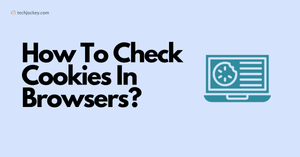What Is Cookie Tracking Software?
Cookies are nothing but short text files that tracks browsing activities and IP address of a user as soon as he/she visits a website. Websites use cookies to remember the information of your visit and make your next visit to the site more relevant and useful. Cookie tracking software goes on any website to scan and identify the presence of cookies, tags, beacons, local objects or tracking pixels. These website tracking technologies along with videos and plugins help companies disclose all possible trackers on a website to the visitors and get their tracking consent.
Get consent for tracking from users is important for websites as per the regulations like ePrivacy and GDPR. Cookie tracking software is the short scripts deployed on websites to scan cookies and trackers and generate a cookie result for privacy teams to create privacy policies and add consent forms.
How Do Tracking Cookies Work?
Tracking cookies are marketing cookies, which are placed on your browser for years to collect information about your browsing behavior. Such cookies further share insights from your browsing details with third parties for marketing and advertising purposes. However, tracking cookies require the end user’s consent to track their browsing behavior across different countries of the world.
What Can Cookies Track?
Cookies are used to track all types of data related to users, such as, websites they visited previously, their browser history, Google search history, IP addresses, scrolling speed on a website, etc. Cookies also track the behavior of a visitor on a website, like their scrolling speed, where their hovered the mouse or clicked on a page.
Are Tracking of Cookies Legal
Tracking of cookies is not illegal, however, websites must use them with the user’s consent and in compliance with the latest data privacy rules. Websites that comply with data privacy laws create a sense of trust among its users and they browse through your website information with confidence.
How Do You Manage Tracking Cookies?
To manage cookies in Chrome, you will have to type this link “chrome://settings/content/cookies” in the omnibox. This will give Chrome an indication that you are allowing data from any local site that you visit, but the data will be retained only till the time you shut the browser, or you block cookies completely. The most advisable approach is to restrict third-party cookies of all kinds. Even when you are blocking all third-party cookies, you can set of exception and allow cookies for a few of your favorite sites.
Why Use Cookie Tracking Software?
Cookie tracking software allows you to stay compliant with data privacy laws globally. It helps you to know the type of cookies being used on your website and ensure transparency for the end users. You will be giving full control to the end users, who are visiting your website, who can choose selected cookies and give consent for relevant content.
Further, based on the end user’s preferences, you can further run targeted ads and persuade them to get back to your site, buy products or avail services.
Key Features of Cookie Tracking Software
Some of the major functionalities of cookie tracking software are consent management, monitoring and control, data subject access requests automation, vendor risk management, auto update of cookie policy, and so on. Let’s understand these features in detail.
- Cookie Consent Management: Track and manage cookie content for your website by different end users and offer them customized content accordingly.
- Cookie Monitoring: Automatically monitors your website at regular intervals to track cookies and other types of trackers on your website. Also, new cookies are updated automatically in your company’s cookie policy.
- Cookie Control: Allows you to auto-block all types of first-party and third-party cookies on your website until a user agrees to it.
- Vendor Risk Management: Identifies the risks associated with different vendors and analyses how secure your customer’s data is with them. Based on the privacy T&Cs of different vendors over time, you can decide further procurement and stay up to date with compliance laws.
- DSAR Automation: It automates and centralizes the processing of data subject access requests (DSAR). This will strengthen your compliance efforts and give a boost to the confidence of your employees, customers, and partners.
- Cookie Widget: Cookie widgets are used to show pop-ups on your website explaining the purpose of different cookies and give users the option to activate or deactivate cookies of their choice.
Benefits of Cookie Tracking Software
Cookie tracking software has several advantages for businesses as it allows them to manage cookie consent and utilize any user’s browsing data only after his/her consent. This, in turn, ensures that a customer’s data is secure on your website and helps build a relationship of trust. Here’re some other benefits of cookie-tracking software:
- Minimizes the non-compliance risk: There are different regulations for web visitors’ data protection, such as Brazil’s General Data Protection Law (LGPD), California’s Consumer Privacy Act (CCPA), and Data Processing Agreement (DPA). Cookie tracking software regularly monitors your websites and ensures that your website is complying with all these regulations. The possibility of violating any of the mentioned compliance laws is reduced significantly,
- Builds the trust of customers: The data of customers is shared with third parties only after their consent to the use of their information for specific purposes. So, such customers are less likely to question your website for sharing their data with advertisement and marketing agencies.
- Analyses Consent Requirements Based on a Customer’s Location: Privacy requirements of different customers’ data vary in terms of location. As the cookie consent regulation laws are different across countries, the software automatically matches a customer’s data with his/her location and identifies the compliance requirements. With the careful usage of geo-location data, the risk on noncompliance is minimized visibly.
Top Cookie Tracking Software List
Here’s the list of cookie-tracking software along with their features and pricing:
- Seers
- Cookiebot
- Clym
- Osano
- Illow
- Axeptio
- MineOS
| Cookie Tracking Software | Key Features | Pricing |
| Seers | Google Consent Mode, Blocking of scripts, Automatic update of cookie policy | $10/month |
| Cookiebot | Cookie consent, monitoring & control, Ensures regulation with GDPR, CCPA, LGPD and VCDPA | Free plan available | Premium plan starts from $12 per domain per month |
| Clym | Continuous scanning, Accessibility profiles, Compliance widget | $49 per month |
| Osano | CCPA, CPRA and GDPR compliant, Subject rights management, Vendor privacy risk management | $240 per month |
| Axeptio | Site compliance checker, Cookie widget, Terms for creating T&Cs | €15 per month |
| Illow | Cookie banner generator, Compliance check | $10 per month |
| MineOS | No code integration of API, Consent management for both apps and websites | Price on request |
What Should You Look for in Cookie Tracking Software?
When you are searching for cookie tracking tools, don’t confine yourself to just the cookie notifications. You should look for many other factors to ensure that your website complies with privacy regulations.
- The software should maintain the consent records of your website visitors.
- It should manage consent issues related to the location of GDPR data storage.
- The software must offer APIs to successfully run and deliver consent popups.
- There should also be a dashboard where you can track and monitor different cookie consent activities.
- Free trial or demo to let you asses the software for certain period and make an informed purchase.
- Integration of cookie tracking software with popular web platforms like content management system and hosting software is important for the seamless functioning of your website.
- Most important, the cookie tracking software you choose should cost effective with hassle-free payment plans.





















